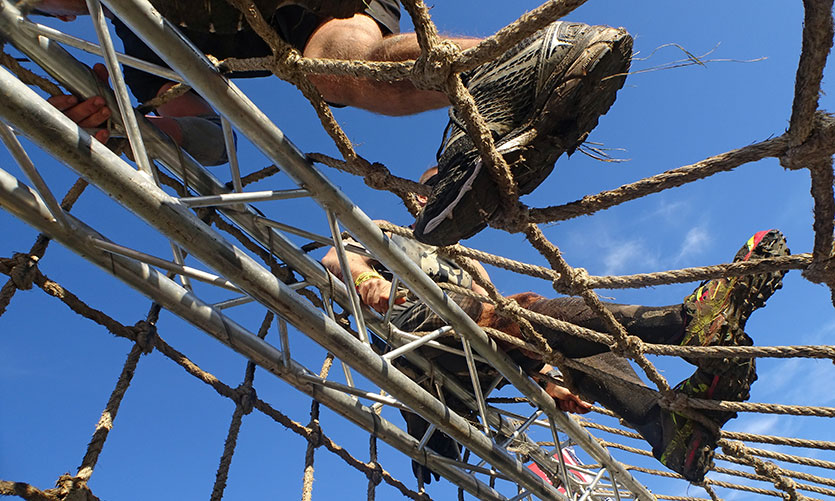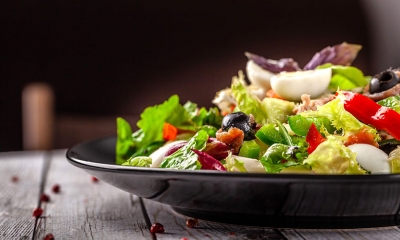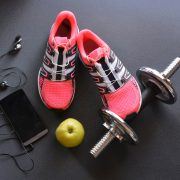Talking Spartan Prep, Home Workouts, and Health with Spartan Founder Joe De Sena

COVID-19 has people are stuck in their houses, video conferencing from their kitchen tables, creating home workouts, and staying distant to stay safe. Joe De Sena, the founder and CEO of Spartan, has another suggestion.
“Socially distance from your kitchen.”
If you’ve read about or participated in a Spartan Race, it’s no surprise De Sena wants people outside and moving. It’s a key part of his Spartan doctrine. To dig deeper into De Sena’s health and fitness philosophy—with a focus on Spartan preparation at home–Ask the Scientists’ Austin Winegar conducted a wide-ranging interview.
Inside Joe De Sena’s Spartan Mindset
Austin Winegar: What parts of the body would you focus on for Spartan preparation? And why do you think those are the most important areas?
Joe De Sena: The number one thing we’re motivated by is the avoidance of discomfort. There are a few of us that are outliers or maniacs that wake up early and get after it. So, my answer to that question has to be very digestible, very possible for folks to engage in. I would say, at a minimum, it’s 30 burpees, 30 of the best pullups you could muster up, and it’s a one-mile walk or run. Obviously, I can go much deeper than that, but I’ll scare people if I do. So, I’ve tried to tone down my message to something really scalable. Walk, crawl, whatever—one mile. Park a little further away from the grocery store when you shopping. Anybody could do 30 burpees in two minutes—even stretch it out to three minutes. And if you can’t do a pull-up, jump up 30 times. If you just did that, it’d change your whole life.
AW: Digestible things that are realistic is your number one recommendation?
JD: It’s gotta be realistic. It’s gotta be something people will actually do. I could give you a giant list that looks like one of those scrolls a king would drop, of things I’d want people to do every day. But nobody’s doing it. I’ve been putting on races for 20 years. And for 10 of those years I used to have to lie to people and tell them they were coming to a barbecue, because they don’t want to do it. ‘Joe, why are we getting up at 5 a.m. for a barbecue?’ ‘Well, we gotta carry the barbecue up the mountain.’ Little did they know they were the ones that were going to be getting barbecued. True story. I’m not kidding.
I would also do hot yoga as often as I could. I would sit in a sauna post-workout. I would take cold showers. I would take stairs instead of elevators. I would carry a kettlebell. I do thousands of crunches. It depends on how far you want me to go with the answer to that question. Yes, I have opinions on physical fitness and diet, but you gotta give people bite-sized pieces.
AW: I’m inclined to agree with your approach. Rather than it being one movement or exercise, it’s probably more important to push whatever your current capabilities are and step it up more every day.
JD: I’d rather see you do it every day—seven days a week—than get after it once, buy a gym membership, go in for two weeks, then disappear for two months. Consistency is everything. Consistency in general, in everything, in life. Stick-to-it-ness. Write it down, be disciplined about it. Forget about motivation. Motivation is fleeting. You might have it, or you might not. Just create a narrative that you constantly talk about in the public. ‘I do 30 burpees every day. I walk one mile, no matter what—rain, snow, shine. I do my 30 pullups even though I’m not good at one pullup. Every single day.’ You say it over and over and before you know it, if you don’t do it, you’ll be a fraud. You gotta do it.
AW: What about diet? Do you follow the same strictness?
JD: I would say if you had the Joe Spartan food pyramid, the very top would be animal protein. The middle would be nuts, oils, and avocados. And the bottom would be veggies.
I would say you must, with all three meals, have a small bowl of salad. And that doesn’t mean covered in ranch dressing, but raw veggies with every meal. If you’re eating eggs—it sounds crazy—but I’ve actually acquired a taste for salad and eggs and sprouts. I don’t need any dressing.
AW: What about Spartan-specific preparation? How much preparation should people do in the weeks leading up to an event?
JD: Do you want to win it?
AW: Let’s say you want to be competitive—upper half—but don’t need to be the first-place person.
JD: We have multiple distance events—three miles, eight miles, 13 miles, 26 miles. Why don’t we keep this to three miles. If your staple training diet was what we said—30-30-1—if you did three days a week of hot yoga on top. ‘Why would we do hot yoga, Joe?’ Because the only thing that’s going to stop you from doing well is injury. So, to avoid injury we have to keep you mobile and flexible. I’m a big believer in that. I would get one five-mile run in a week, and I would spend some time on a rope. Out at a Spartan race, a lot of people struggle with the rope. The pullups will get you through the other hanging things. You’re going to need some grip strength, so I would spend a lot of time on a rope every week.
Let’s say you gotta do 10 rope climbs a week. One five mile run. And three classes of hot yoga. On top of that basic 30-30-1. You’d crush it. You’d do great. And fitness starts in the kitchen, so you want to be eating healthy. You don’t want to be doubling up on chocolate cake while you’re doing this.
AW: How do people set up ropes in smaller spaces?
JD: You could literally hang it off of a pullup bar. It’s not going to be ideal, but if you had no other choice, you’d start sitting down. In the beginning, you aren’t going to be able to get off your butt with your legs straight out like a gymnast and climb up. But you could leave your heels on the ground and work your way up to a standing position and work your way back down to a sitting position. You do it enough times to where your grip strength is able to get you standing up and sitting down.
AW: What’s people’s usual weakness?
JD: Grip strength, in general, is going to break you in a Spartan Race because there’s so many things to hold onto if you’re not used to it. Also, on the rope, it’s technique. You could deal with the lack of technique if you can get your hands strong enough. You’ll get sucked up in the vortex of the people and the music and you’ll get up that rope and ring the bell.
AW: What are the bodyweight exercises you’d have people do?
JD: We do them all. Reverse lunges. Leonidas burpees—which is a double perfect pushup at the bottom. Inverted pushups. I love all kinds of yoga poses. I’ve basically taken a bunch of yoga poses and turned them into callisthenic exercises. So, I’m working on mobility and flexibility at the same time I’m getting a workout.
AW: Why is a healthy approach to life important for people, in general, and not just those looking forward to Spartan Races?
JD: I’m glad you asked that question, because it’s the biggest thing we didn’t talk about. You guys have watched boxing matches throughout your life. The interesting thing about most of those boxers is they fall out of shape. As soon as they get a date on the calendar, they start getting in shape for the fight. And most people are like that. If they don’t have something on the calendar, they don’t get after it.
When I think about why I started Spartan, I recognized 30 years ago if I didn’t have a date on the calendar, I wasn’t training hard enough. I’d go through the motions, but as soon as there’s a date on the calendar—a fight that’s on the calendar, whatever that fight means in your life—you get after it. You work out a little harder. You put down that cookie. You go to bed a little earlier. You get serious. That’s why it’s so important—it doesn’t have to be a Spartan Race, though I wish it were—but it could be anything hard, anything challenging that forces people to change their habits for the better.
Life and health all come down to blood flow and circulation and what you’re putting in your mouth. So, I think of a body like a swimming pool. A swimming pool is 20,000 gallons of water, and the human body is seven gallons of water—depending on your size. A swimming pool has a pump and filter. You have a pump and filter. And a 20,000-gallon pool, if I started throwing French fries and coffee drinks and ketchup and all kinds of things in that pool, and then I turned the pump off and the filters got dirty, it turns black pretty quick. So, we’re expecting this little swimming pool, our body, with this little pump and a few filters to keep clean with all the stuff we keep stuffing into our mouths. Then we aren’t running the pump because we’re sitting on the couch and we’re not cleaning the filters. So, that’s why it’s important for everybody.
Start Your Spartan Journey to Better Health
Now that you’re pumped and ready to turn up the heat on your fitness journey, start with Joe’s 30-30-1 advice. Then try to build out with more home workouts you can try to supplement the Spartan advice you just received.
For more information on Spartan Races and preparation, head over to their site.















